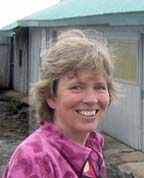Alice Pell named director of international development institute
Alice Pell, a professor in the Department of Animal Science, has been named director of the Cornell International Institute for Food, Agriculture and Development (CIIFAD). The appointment was effective July 1.

CIIFAD works with local universities, nongovernmental organizations, extension services and other partners overseas to reduce rural poverty and develop sustainable food systems in Africa, Asia and Latin America. The universitywide program was established in 1990 and operates within the administrative framework of the International Programs of the College of Agriculture and Life Sciences (CALS).
"We are directly involved with farmers, community organizations, universities and governments to develop locally appropriate solutions," said Pell, noting that CIIFAD's projects are scaled primarily to the "micro" level and focus on individuals, villages and landscapes. "Our hope is that these solutions will be robust enough to spread widely, but we do not explicitly focus on national policymaking."
Ronnie Coffman, director of CALS International Programs and chair of the Department of Plant Breeding, said of Pell's appointment, "Alice's interests and experience place CIIFAD in a strong position to contribute to Cornell's sustainability initiative, particularly in Africa, where she oversees a major portfolio of projects. She has the breadth and vision necessary to realize CIIFAD's mandate to mobilize faculty and students across the entire university community to confront the challenges at the nexus of population growth, food insecurity and environmental degradation."
Over the past few months, Pell has been asking CIIFAD faculty where they think the organization should focus its efforts. "Poverty and environmental sustainability are the themes that come out of every discussion," she said. "We need to stimulate discussions among engineers, economists, sociologists, nutritionists and agriculturalists, and get beyond our disciplinary lingo so that we really communicate with each other and with those with whom we are working."
Though the majority of faculty members working with CIIFAD are based in CALS, faculty from Arts and Sciences, Human Ecology and Engineering also contribute to the program. "There are no criteria for belonging to CIIFAD except a desire to make a difference in the lives of the people we're working with by alleviating environmental degradation and poverty," Pell explained. "CIIFAD has gone beyond lip service to the interdisciplinary ideal and put it into practice to address very pressing global problems."
Pell, whose current research involves developing bio-economic models to analyze and improve the performance of crop and livestock systems, has solid multidisciplinary credentials herself. A cum laude graduate of Radcliffe College with an A.B. in architectural science, she wrote her undergraduate thesis while teaching English, history, development studies and geography in Botswana with the Peace Corps. Upon her return to the United States, she enrolled at Harvard University and earned a master's degree in international education.
After teaching and running a farm in Vermont, she took undergraduate science courses at the University of Vermont and then earned M.S. and Ph.D. degrees there in animal science. She stayed on as a faculty member and came to Cornell in 1990 as an associate professor.
Media Contact
Get Cornell news delivered right to your inbox.
Subscribe